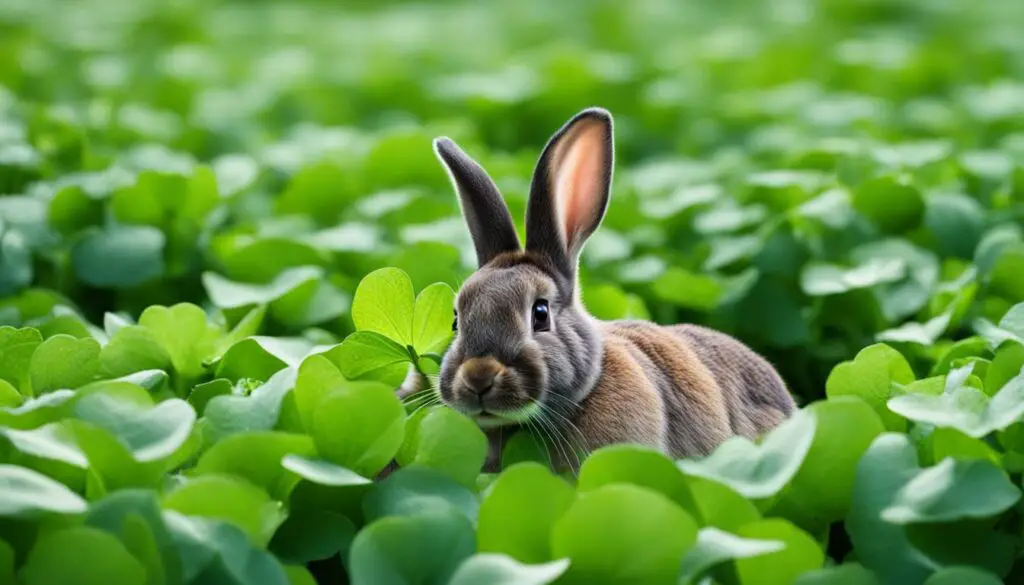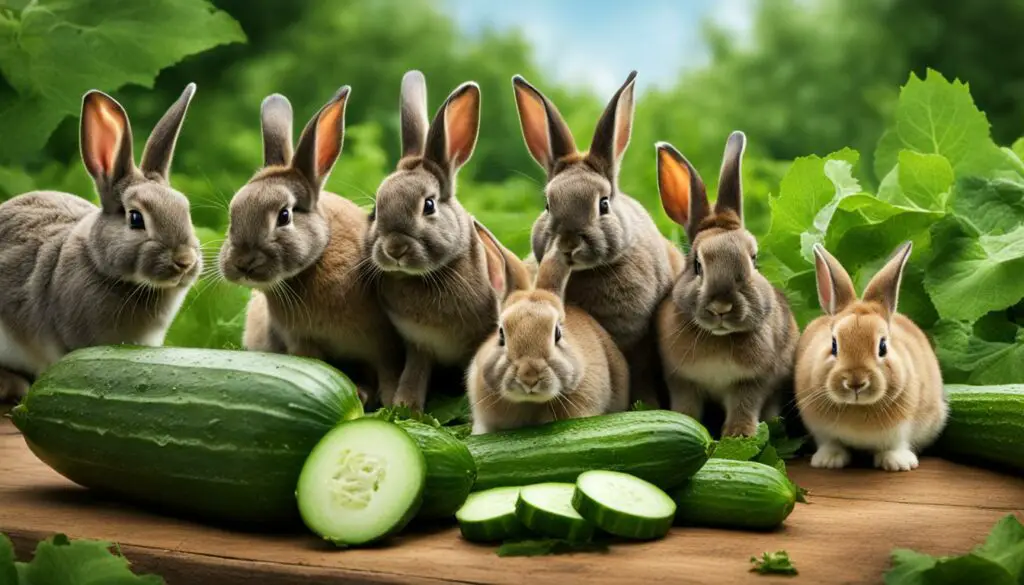Can bunnies have cucumbers? It’s a common question among rabbit owners, and the answer is yes! Cucumbers can be a safe and healthy treat for rabbits when given in moderation. In this article, I will provide all the information you need to know about feeding cucumbers to rabbits and the importance of balanced nutrition for these furry friends.
Key Takeaways:
- Rabbits can eat cucumbers, including the seeds and skin, but they should only be a small part of their diet. Hay and water should be the main food.
- Cucumbers are low in calories and contain potassium and vitamin A, making them a good treat for obese rabbits.
- Fiber is essential for a rabbit’s digestive health, and cucumbers do not provide enough fiber. Hay should always be the primary component of their diet.
- Feeding too much cucumber can lead to digestive issues and diarrhea in rabbits. Moderation is key.
- It is important to introduce cucumbers slowly into a rabbit’s diet and monitor their response. Baby rabbits should not be fed cucumbers until they are at least 12 weeks old.
Nutritional Value of Cucumbers for Rabbits
When it comes to incorporating cucumbers into a rabbit’s diet, it is important to understand their nutritional value. Cucumbers are mostly water, low in calories, and contain small amounts of fiber, iron, magnesium, potassium, vitamin A, and vitamin C. While these nutrients can provide some benefits to rabbits, it is crucial to remember that cucumbers should not be the main source of nutrition for these furry friends.
Hay should always be the primary component of a rabbit’s diet, as it provides the necessary fiber for maintaining digestive health. Vegetables and fruits, including cucumbers, can be offered to rabbits in small portions as treats. However, it is essential to ensure that the majority of their diet consists of hay, with cucumbers being a supplemental addition.

Nutritional Comparison of Cucumbers and Hay
| Nutrient | Cucumbers (per 100g) | Hay (per 100g) |
|---|---|---|
| Fiber | 0.5g | 30g |
| Calories | 15 | 90 |
| Potassium | 147mg | 405mg |
| Vitamin A | 3μg | 0μg |
As the table above demonstrates, hay provides significantly higher levels of fiber, calories, potassium, and vitamin A compared to cucumbers. This reinforces the importance of hay as the mainstay of a rabbit’s diet and highlights the supplementary nature of cucumbers as a treat. Remember to always consult with a veterinarian to ensure the proper balance of nutrients and portion sizes for your rabbit’s specific needs.
Importance of Fiber in a Rabbit’s Diet
When it comes to a rabbit’s diet, fiber plays a crucial role in maintaining their digestive health. Hay, such as Timothy hay, is the primary source of fiber for rabbits. It helps to keep their teeth worn down and their digestive system functioning properly. Fiber is essential for preventing conditions like gastrointestinal stasis, which can be life-threatening for rabbits.
While rabbits may enjoy the taste of cucumbers as a treat, they should not rely on them for their fiber intake. Cucumbers have a low fiber content, and feeding them in excess can disrupt a rabbit’s digestive system. It’s important to prioritize a rabbit’s main diet, which should consist mainly of hay, water, and limited amounts of vegetables and fruits.
| Fiber Content Comparison | Hay | Cucumbers |
|---|---|---|
| Fiber Content | High (25-30% fiber content) | Low (0.5-1% fiber content) |
| Importance in Diet | Essential for digestive health and dental wear | Should be given in moderation as a treat |
While cucumbers can provide hydration and some nutrients, they should not replace the necessary fiber intake from hay. It’s essential to maintain a balanced diet for rabbits to ensure their overall well-being. If you have any concerns about your rabbit’s diet or health, it is always best to consult with a veterinarian.
Guidelines for Feeding Cucumbers to Rabbits
When it comes to feeding cucumbers to rabbits, there are a few important guidelines to keep in mind. While cucumbers can be a safe and healthy snack for rabbits, moderation is key. It is important to introduce cucumbers slowly into a rabbit’s diet and monitor their response. Too much cucumber can lead to digestive issues and diarrhea in rabbits, so it’s important to feed them in appropriate portions.
Mature rabbits should be given a portion size of cucumber no bigger than 1 tablespoon for every 2 pounds of body weight. This ensures that they receive a small but satisfying treat without overdoing it. It’s also important to note that baby rabbits should not be fed cucumbers until they are at least 12 weeks old. Their sensitive stomachs need time to develop and adjust to solid foods.
| Rabbit Age | Portion Size |
|---|---|
| Mature rabbits | No more than 1 tablespoon for every 2 pounds of body weight |
| Baby rabbits (at least 12 weeks old) | Cucumbers should be introduced slowly |
In addition to portion control, it’s important to consider the nutritional value of cucumbers for rabbits. While cucumbers are low in calories and contain some vitamins and minerals, they should not replace the main components of a rabbit’s diet. Hay should always be the primary source of nutrition for rabbits, with vegetables and fruits being offered in small portions as treats.
By following these guidelines and considering the specific needs of your rabbits, you can safely incorporate cucumbers into their diet as a healthy and appropriate snack.
Potential Risks of Feeding Cucumbers to Rabbits
While cucumbers can be a refreshing and healthy treat for rabbits, it’s important to be aware of the potential risks associated with feeding them in excess. Rabbits have sensitive digestive systems, and consuming too much cucumber can lead to diarrhea and gastrointestinal stasis, a serious condition where the digestive system slows down or stops completely.
The high water content in cucumbers can cause runny stools in rabbits, making it difficult for them to consume their caecotropes, which are essential for nutrient absorption. If a rabbit develops diarrhea or stops producing normal droppings, immediate veterinary attention is necessary to prevent dehydration and ensure proper digestion.
It’s crucial to practice moderation when offering cucumbers to rabbits. They should only be given a small portion, such as 1-2 slices, once or twice a week. Cucumbers should not replace the main components of a rabbit’s diet, such as hay and water, which provide essential fiber and nutrients. Consider cucumbers as a healthy and occasional treat option for your furry friend, but be cautious not to overfeed them to avoid any potential health problems.
| Risks of Feeding Cucumbers to Rabbits | Prevention and Tips |
|---|---|
| Diarrhea and gastrointestinal stasis | Feed cucumbers in moderation and monitor your rabbit’s digestive health |
| Difficulty consuming caecotropes | Ensure your rabbit can still consume caecotropes by limiting cucumber intake |
| Dehydration | If your rabbit experiences diarrhea, seek immediate veterinary attention |
Remember, every rabbit is unique, and while some may enjoy cucumbers, others may have different preferences. Always introduce new foods slowly and monitor your rabbit’s response to ensure their well-being. If you have any concerns or questions about feeding cucumbers to your rabbit, consult with a veterinarian who specializes in small animal care.

Pet Owner Quote:
“I love treating my rabbit to a slice of cucumber every now and then, but I always make sure to offer it in small portions. I learned the importance of moderation after my bunny experienced digestive issues from eating too much cucumber. Now, I’m more cautious and prioritize a balanced diet with plenty of hay and water.”
Preferences of Rabbits towards Cucumbers
When it comes to feeding cucumbers to rabbits, their preferences can vary. Just like humans, rabbits can have different tastes and preferences when it comes to food. Some rabbits may enjoy eating cucumbers, relishing the crunchy texture and refreshing taste. However, there are also rabbits that may not have a particular liking for cucumbers and may show little interest in them.
It is important to offer a slice or two of cucumber to your rabbit and observe their response. If they eagerly munch on the cucumber and seem to enjoy it, you can continue to include cucumbers in their diet as an occasional treat. On the other hand, if your rabbit shows little interest or doesn’t seem to enjoy cucumbers, it’s best not to force them to eat it.
Remember, rabbits have specific dietary needs, and their main diet should consist of hay, which provides them with essential fiber. Cucumbers should only be a small part of their diet, offered as a treat. It’s always a good idea to consult with a veterinarian about your rabbit’s diet and any specific preferences or dietary restrictions they may have.

In summary, rabbits can have individual preferences when it comes to cucumbers. Some rabbits may enjoy them as a tasty treat, while others may not have a strong preference for them. When feeding cucumbers to your rabbit, pay attention to their reaction and adjust their diet accordingly. Always prioritize their main diet of hay and consult a veterinarian for personalized advice.
Cucumbers in Relation to a Balanced Rabbit Diet
When it comes to a balanced rabbit diet, cucumbers should only play a small role. While rabbits can safely eat cucumbers, they should not be the main component of their diet. Hay should be the primary food for rabbits, providing them with the necessary fiber, protein, and minerals. Alongside hay, offering a variety of greens and limited amounts of vegetables and fruits can ensure a well-rounded diet for your furry friend.

Cucumbers can be included as a healthy treat option for rabbits. They offer some hydration and contain certain vitamins and minerals that rabbits need. However, it’s important to remember that too much cucumber can lead to digestive issues and diarrhea in rabbits. Moderation is key when it comes to feeding cucumbers to your bunny.
While some rabbits may enjoy eating cucumbers, others may not have a preference for them. Just like humans, rabbits can have different tastes and preferences. It’s always a good idea to offer a slice or two of cucumber to see if your rabbit likes it. If they do, you can incorporate it into their diet as an occasional treat.
Key Points:
- Cucumbers should only be a small part of a rabbit’s diet.
- The main food for rabbits should be hay, providing fiber, protein, and minerals.
- Cucumbers can be included as a healthy treat, but should not replace the main diet components.
- Feeding cucumbers in moderation is important to avoid digestive issues and diarrhea.
- Rabbits can have different preferences for cucumbers, so offering them as a treat is a good way to find out if your rabbit enjoys them.
By keeping cucumbers as a small and occasional part of your rabbit’s diet, you can ensure that they receive the necessary nutrients while avoiding any potential health problems. As always, consult a veterinarian if you have any concerns about your rabbit’s diet or health.
Cucumber Seeds, Skin, and Leaves for Rabbits
Rabbits can safely eat cucumber seeds, skin, and leaves. The skin of the cucumber is actually the most nutritious part for rabbits, as it provides fiber and other essential nutrients. However, if your rabbit doesn’t like the taste or texture of the skin, it’s okay to remove it before feeding them. The seeds of the cucumber are also safe for rabbits to eat.
When offering cucumber leaves to your rabbit, make sure they are clean and free from any pesticides or chemicals. Cucumber leaves can be a healthy addition to a rabbit’s diet and can be given along with the cucumber itself. Just remember to introduce any new food slowly and in small amounts to avoid upsetting your rabbit’s digestive system.

Benefits of Cucumber Seeds, Skin, and Leaves for Rabbits
- The skin of the cucumber is rich in fiber, which helps promote healthy digestion in rabbits.
- Cucumber seeds contain essential nutrients like vitamins and minerals, providing additional nutritional value for rabbits.
- Cucumber leaves can be a source of variety in a rabbit’s diet, offering different flavors and textures.
Incorporating cucumber seeds, skin, and leaves into your rabbit’s diet can add some diversity and provide them with extra nutrients. However, remember to feed cucumbers in moderation and always prioritize hay as the main component of your rabbit’s diet. If you have any concerns or questions about feeding cucumbers to your rabbit, it’s best to consult with a veterinarian for personalized advice.
Moderation is Key when Feeding Cucumbers to Rabbits
When it comes to feeding cucumbers to rabbits, moderation is key. While rabbits can safely enjoy cucumbers as a healthy treat, it’s important to remember that they should only be given in small portions. Offering 1-2 slices of cucumber a week is sufficient to satisfy your bunny’s taste buds without overloading their digestive system.
Feeding rabbits too much cucumber can lead to digestive issues and diarrhea. The high water content in cucumbers can cause runny stools, making it difficult for rabbits to properly digest their food. To prevent any potential health problems, it’s best to introduce cucumbers slowly into your rabbit’s diet and closely monitor their response.
Remember that cucumbers should not replace the main components of a rabbit’s diet. Hay should always be the primary source of nutrition for rabbits, providing the necessary fiber, protein, and minerals. Along with hay, rabbits should be offered a variety of greens and a limited amount of vegetables and fruits. Cucumbers can be included as a healthy treat option, but should not be the main focus of their diet.

The Importance of Variety in a Rabbit’s Diet
In addition to feeding cucumbers in moderation, it’s crucial to provide a balanced and varied diet for your rabbit. Offering a wide range of vegetables and fruits ensures that your bunny receives all the necessary nutrients and prevents boredom. Remember to introduce new foods gradually and monitor your rabbit’s reaction to ensure they tolerate the new additions well.
“Feeding rabbits a well-balanced diet is essential for their overall health and well-being. While cucumbers can be a tasty and hydrating treat for bunnies, they should always be given in moderation, alongside a diverse mix of other vegetables and fruits.” – Dr. Emily Thompson, Rabbit Nutrition Expert
By maintaining a balanced approach to feeding cucumbers to rabbits, you can keep your furry friend happy and healthy. Remember to consult with a veterinarian if you have any concerns about your rabbit’s diet or if you notice any digestive issues. With proper care and attention, your bunny can enjoy the occasional cucumber treat without any adverse effects.
Potential Digestive Issues from Feeding Cucumbers to Rabbits
Feeding rabbits cucumbers can have potential digestive consequences if not done in moderation. While cucumbers are generally safe for rabbits, overfeeding can lead to diarrhea and soft cecotropes, which are essential for the rabbit’s nutrient intake. Diarrhea can cause dehydration and prevent proper digestion, while soft cecotropes can become difficult for rabbits to re-consume if their stools are too runny. It is crucial to monitor a rabbit’s cucumber intake and seek immediate veterinary attention if any digestive issues arise.
The high water content in cucumbers can contribute to runny stools and make it challenging for rabbits to eat their cecotropes. Cecotropes are nutrient-rich droppings that rabbits produce and consume to obtain B vitamins and other essential nutrients. If a rabbit’s stools become excessively watery, it may indicate an imbalance in their digestive system. In such cases, it is crucial to consult a veterinarian to prevent further complications and ensure the rabbit’s overall health.
When introducing cucumbers to a rabbit’s diet, it is essential to start with small portions and gradually increase the amount over time. This allows the rabbit’s digestive system to adjust and prevents sudden gastrointestinal disturbances. It is also essential to remember that cucumbers should only complement the rabbit’s main diet, which consists primarily of hay. Hay provides the necessary fiber for a rabbit’s digestive health and should be the main component of their diet.

| Potential Digestive Issues from Feeding Cucumbers to Rabbits | Symptoms | Treatment |
|---|---|---|
| Diarrhea | – Watery stools – Dehydration – Decreased appetite |
– Veterinary examination – Fluid therapy – Adjusting diet |
| Soft Cecotropes | – Runny cecotropes – Difficulty re-consuming cecotropes – Nutrient deficiencies |
– Veterinary examination – Adjusting diet and fiber intake – Promoting cecotrope consumption |
In summary, while cucumbers can be a safe treat for rabbits, it is crucial to feed them in moderation to avoid potential digestive issues. Monitoring the rabbit’s cucumber intake, introducing it gradually, and ensuring it complements a balanced diet of hay and other vegetables is key. As with any dietary changes, it is recommended to consult a veterinarian for personalized advice and to address any concerns regarding a rabbit’s digestive health.
Age and Developmental Stage Considerations for Feeding Cucumbers to Rabbits
When it comes to feeding cucumbers to rabbits, age and developmental stage play a crucial role. Baby rabbits, also known as kits, should not be given cucumbers until they are at least 12 weeks old. Their sensitive stomachs are not yet fully developed to handle fresh foods. It is important to introduce new foods gradually to young rabbits, starting with small portions, to ensure that their digestive system can tolerate them.

As rabbits mature, their digestive system becomes more robust, and they can handle a wider variety of foods. This includes cucumbers, which can be introduced into their diet in moderation. Start by offering a small slice or two of cucumber to see if your rabbit enjoys it. Just like humans, rabbits can have different tastes and preferences, so it’s important to observe their response.
Gradually increase the amount of cucumber as your rabbit grows older and shows a positive reaction to it. Remember, cucumbers should only be a small part of a rabbit’s diet, with the main focus being on hay, which provides the necessary fiber, protein, and minerals. Alongside hay, a variety of greens and limited amounts of vegetables and fruits can be offered to ensure a balanced diet for your furry friend.
Key Points:
- Baby rabbits should not be fed cucumbers until they are at least 12 weeks old.
- Introduce new foods gradually to young rabbits, starting with small portions.
- Rabbits’ digestive systems become more robust as they mature, allowing for the inclusion of cucumbers in moderation.
- Observe your rabbit’s preferences and adjust the amount of cucumber accordingly.
- Cucumbers should only be a small part of a rabbit’s diet, with hay being the main food source.
Cucumbers as Part of a Balanced Rabbit Diet
When it comes to providing healthy treats for bunnies, cucumbers can be a great option. They offer hydration and contain essential vitamins and minerals that rabbits need. However, it’s important to remember that cucumbers should only be a small part of a balanced rabbit diet, and they should not replace the main components such as hay and water.
A balanced rabbit diet should primarily consist of hay, which provides the necessary fiber, protein, and minerals that rabbits need for optimal health. Along with hay, rabbits can be offered a variety of fresh greens and a limited amount of vegetables and fruits as treats. Cucumbers can be included in this treat rotation, but moderation is key to avoid any potential digestive issues.
When offering cucumbers to your rabbit, it’s recommended to give them small portions, such as 1-2 slices, a week. Overfeeding cucumbers can lead to diarrhea and soft cecotropes, which are important for a rabbit’s nutrient intake. It’s crucial to introduce cucumbers slowly into your rabbit’s diet and closely monitor their response.
The Benefits of Cucumbers for Rabbits
While cucumbers are low in calories, they offer some nutritional value for rabbits. They are hydrating and contain small amounts of fiber, iron, magnesium, potassium, vitamin A, and vitamin C. These nutrients can contribute to a rabbit’s overall well-being, but it’s important to remember that cucumbers should not be the main source of nutrition for rabbits. Hay should always be the primary component of their diet.
| Nutrient | Amount per 100g of Cucumber |
|---|---|
| Fiber | 0.5g |
| Iron | 0.4mg |
| Magnesium | 8mg |
| Potassium | 147mg |
| Vitamin A | 105IU |
| Vitamin C | 2.8mg |
In conclusion, while cucumbers can be a part of a balanced rabbit diet, they should be given in moderation as a healthy treat. Remember to prioritize hay as the main component of your rabbit’s diet and offer a variety of fresh greens and limited amounts of vegetables and fruits. By providing a well-rounded diet, you can ensure the overall health and well-being of your furry friend.

Conclusion
After thorough research, I have found that bunnies can indeed have cucumbers in their diet. However, it is important to feed them in moderation and as a treat rather than a main meal. Cucumbers are low in calories and can be beneficial for overweight rabbits, providing them with essential vitamins and minerals, such as potassium and vitamin A.
It is crucial to remember that the main food for rabbits should always be hay, as it provides the necessary fiber for their digestive health. Cucumbers should only be given as a supplement to their diet, along with a variety of greens and limited amounts of vegetables and fruits. Overfeeding cucumbers can lead to digestive issues, such as diarrhea and gastrointestinal stasis, so it is important to monitor their intake closely.
If you decide to introduce cucumbers into your rabbit’s diet, start with small portions and monitor their response. Some rabbits may enjoy cucumbers, while others may not show much interest. Remember that each rabbit is unique and may have different preferences when it comes to food.
To ensure the well-being of your bunny, it is always a good idea to consult with a veterinarian regarding their diet. They will be able to provide specific guidelines based on your rabbit’s individual needs and health condition. By following these guidelines and practicing moderation, you can safely incorporate cucumbers into your rabbit’s balanced diet.
FAQ
Can rabbits eat cucumber?
Yes, rabbits can eat cucumber safely, including the seeds and the skin.
Is cucumber a good treat for obese rabbits?
Yes, cucumber is a good treat for obese rabbits as it is low in calories and contains potassium and vitamin A.
Should cucumber be the main food for rabbits?
No, cucumber should only be a small part of a rabbit’s diet, with the main food being hay and water.
What nutrients are present in cucumbers?
Cucumbers are mainly water, low in calories, and contain small amounts of fiber, iron, magnesium, potassium, vitamin A, and vitamin C.
How much cucumber should rabbits be given?
Mature rabbits should be given a portion size of cucumber no bigger than 1 tablespoon for every 2lb of body weight.
What are the potential risks of feeding too much cucumber to rabbits?
Feeding too much cucumber can lead to digestive issues and diarrhea in rabbits.
Can baby rabbits eat cucumbers?
No, baby rabbits should not be fed cucumbers until they are at least 12 weeks old.
Are cucumber seeds and skin safe for rabbits?
Yes, rabbits can safely eat cucumber seeds, skin, and leaves.
How often should rabbits be given cucumber?
Rabbits should only be given a small portion of cucumber, about 1-2 slices, a week.
What are the potential digestive issues from feeding too much cucumber to rabbits?
Feeding rabbits too much cucumber can cause diarrhea and soft cecotropes.
Are there any considerations for feeding cucumbers to rabbits based on their age?
Yes, baby rabbits should not be given cucumbers until they are at least 12 weeks old.
Can cucumbers be part of a balanced rabbit diet?
Yes, cucumbers can be part of a balanced rabbit diet when given in moderation.








